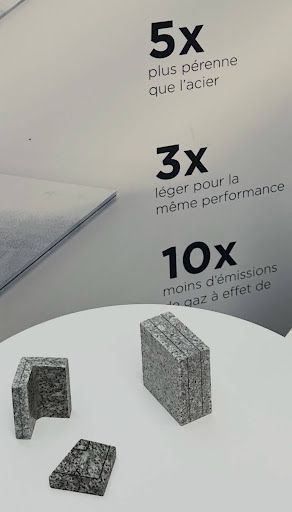TechnoCarbon Launches Unprecedented Low-Carbon Solar Carport in Provence, Reinventing Renewable Infrastructure

TechnoCarbon, an innovator in sustainable building materials, has announced the exciting launch of its first solar carport structure next to Provence Airport, marking a breakthrough in renewable energy infrastructure. The project, which combines solar panels with the company's proprietary carbon fibre-stone technology, Pierre-Carbone, showcases how small-scale structures can deliver major carbon savings.
The launch will take place in two phases over the next two weeks. The first week will see the completion of the carport's construction, while the second week will connect it to the electricity grid. Designed to park six cars, the carport represents a modest yet significant demonstration of the company's technology. By replacing conventional steel and aluminium with TechnoCarbon's low-carbon composite, the project aims to reduce the emissions typically associated with traditional construction materials.
Founded in 2018 by aerospace engineer and climate technologist Stephan Savarese, TechnoCarbon is dedicated to tackling emissions from the construction industry, which accounts for nearly 37% of global greenhouse gases. "At a climate conference in Paris, I realised climate change was already catastrophic, and materials were being overlooked," Savarese states. "This project proves that even small-scale structures can make a big impact when built with sustainable materials."
The patented Pierre-Carbone technology reinforces natural stone with carbon fibre, creating a material that is both durable and elastic. Unlike steel, it does not corrode, requires no foundation, and has a lifespan that can stretch across centuries. This makes it particularly suited for applications in construction, maritime engineering, and renewable energy infrastructure. "Stone is as flexible as aluminium, but fragile," Savarese explains. "The carbon fibre reinforcement allows it to deform without breaking, creating an ecological material with extraordinary longevity."
Savarese suggests that the material can resist wear for decades without degradation, which could make it particularly suited to coastal environments where corrosion normally wreaks havoc on steel structures.
Orhiane Savarese, part of the leadership team at TechnoCarbon, emphasised the importance of this first structure as a proof of concept. "The solar industry faces a paradox: panels produce clean energy, but their supporting structures often rely on highly polluting materials," she explains. "Our solar carport demonstrates a viable alternative, one that drastically cuts emissions while offering long-term durability with minimal maintenance requirements."
With upcoming European regulations requiring parking lots to be covered with solar installations by 2030, demand for low-carbon solutions is expected to grow rapidly. TechnoCarbon is already receiving significant interest from supermarkets and infrastructure developers across Europe for its pioneering technology.
"This is just the beginning," Savarese adds. "People often forget that even renewable energy infrastructure carries a carbon footprint. Our technology proves that it doesn't have to. If we can cut emissions in the very materials we build with, we can change the trajectory of climate action." The Provence carport not only signals a technological milestone but also reflects a broader vision of building the future of renewable energy on sustainable foundations.
© Copyright IBTimes 2025. All rights reserved.




















